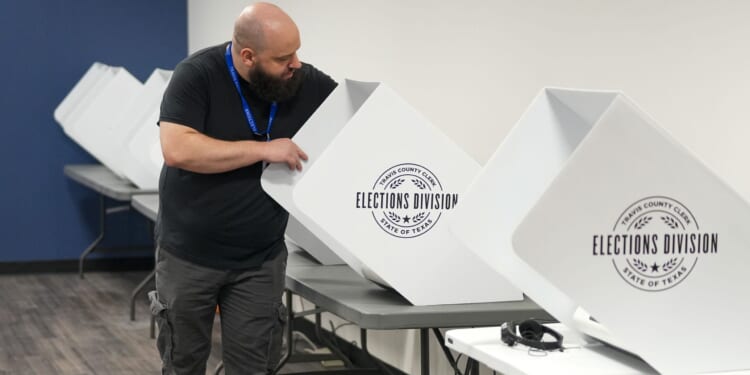Texas voters approved a first-in-the-nation parental rights initiative Tuesday.
Lone Star state voters also approved a state constitutional amendment requiring citizenship to vote in the state. Meanwhile, Maine voters rejected an election reform measure that included adopting voter ID.
Voters in six states decided on 24 statewide measures on Tuesday, according to Ballotpedia, a handful of which had national consequences. Of the total, 17 were proposed amendments to the Texas Constitution.
Parental Rights
Texas’ Proposition 15, which adds parental rights to the state constitution, passed, The Associated Press projected after 10:30 p.m. This means parents will have the final authority over their children’s care and upbringing.
Texas will become the first state to add such a measure to its constitution, though it is among 26 states that have a “parents’ bill of rights” in the law.
The amendment will make Texas the best place to raise children, said Andrew Brown, vice president of policy for the Texas Public Policy Foundation, who helped draft the amendment for approval in the Legislature.
“It’s significant that Texas will be the first state to affirm in its state constitution the sanctity of the parent-child relationship that the U.S. Supreme Court and the Texas Supreme Court already upheld for 100 years,” Brown told The Daily Signal.
He noted that protects children.
“Child protective services functions to protect children from harm or the danger of harm is a legitimate state police power,” Brown said. “In the language of the amendment, it’s clear that parental rights derive from parental responsibilities to care for their children.”
The amendment could affect matters such as gender policies, contraception, and other controversial matters in schools.
The measure had unanimous support in the state Senate and broad bipartisan support in the House, with no organized opposition.
“The amendment recognizes what we already know intuitively, but freedom is fragile,” said Jonathan Covey, director of policy for Texas Values. “Parents have the right to protect their children today under court precedent. But going 10 to 15 years from now, if a judge changes his mind, or if we have a different culture, it could remove it.”
Several conservative groups, as well as the Texas Libertarian Party, supported the measure.
Election Integrity Measures
A Maine proposal to adopt voter ID and other election security measures failed, according to The Associated Press.
Maine is an outlier, as 36 other states have some form of voter-ID requirement. Of those, 24 require photo IDs.
Opponents of the measure led the money race, raising $2.6 million, compared with $649,000 raised by supporters, according to Ballotpedia.
“It’s clear that the ballot summary was skewed to avoid addressing voter ID. The secretary of state put her thumb on the scale to shift the discussion away from voter ID,” Jason Snead, executive director of the Honest Elections Project, told The Daily Signal. “Today, opponents are treating this as an attack on absentee voting. Tomorrow, they will call this a defeat for voter ID. This was a deliberate and calculated approach.”
In addition to requiring photo ID for voting, Maine’s Question 1 would have also limited each municipality to one ballot drop box. It would further have required a bipartisan group of election officials to collect ballots from drop boxes.
“This shows that voters in Maine saw through the campaign to cast this as something other than voter ID. Poll after poll shows that voter ID is very popular with Democrats and Republicans,” Snead added.
By contrast, voters in Texas approved Proposition 16 to amend the state constitution to ban noncitizens from voting.
“Texas will be yet another state to lock into its constitution that noncitizens should not vote. It’s crystal clear that this is not a controversial issue, and has even passed in blue and purple states,” Snead said. “More states need to put teeth into this issue with laws. This is not controversial.”
Already, 14 states have passed similar statewide bans on noncitizen voting. Of those, eight states passed the bans as recently as last November.
The move came in part to stop municipalities from granting voting rights to noncitizens. Local jurisdictions in California, Illinois, Maryland, and Vermont, as well as the District of Columbia, have allowed noncitizens to vote in certain local elections, such as for mayor and school board.
The measure passed both houses of the Texas Legislature with bipartisan support. Nevertheless, the measure was opposed by the American Civil Liberties Union, Common Cause of Texas, and the state Democratic Party.
Gov. Greg Abbott and the Republican Party supported the measure, along with several conservative groups in the state.
Other notable ballot measures included:
- A gun control measure in Maine passed, despite opposition even from Democrat Gov. Janet Mills. The measure establishes a process for obtaining an “extreme-risk protection order” that will allow family members or law enforcement to ask a court to restrict a person’s access to firearms if the court determines the person poses a danger to others or to themselves.
- Texans passed a constitutional amendment, Proposition 3, to deny bail for those charged with murder; capital murder; aggravated assault resulting in serious bodily injury performed with a weapon; aggravated kidnapping, robbery, and sexual assault; indecency with a child; and human trafficking.
- In addition to electing a new mayor, New York City voters also approved a measure to move the city’s elections to coincide with presidential election years beginning in 2028. However, the state constitution requires municipal elections in odd-numbered years. So, for the change to take place, the state Legislature and voters would have to approve a state constitutional amendment. The catch is that the state still has to sign off with a state constitutional amendment.

















